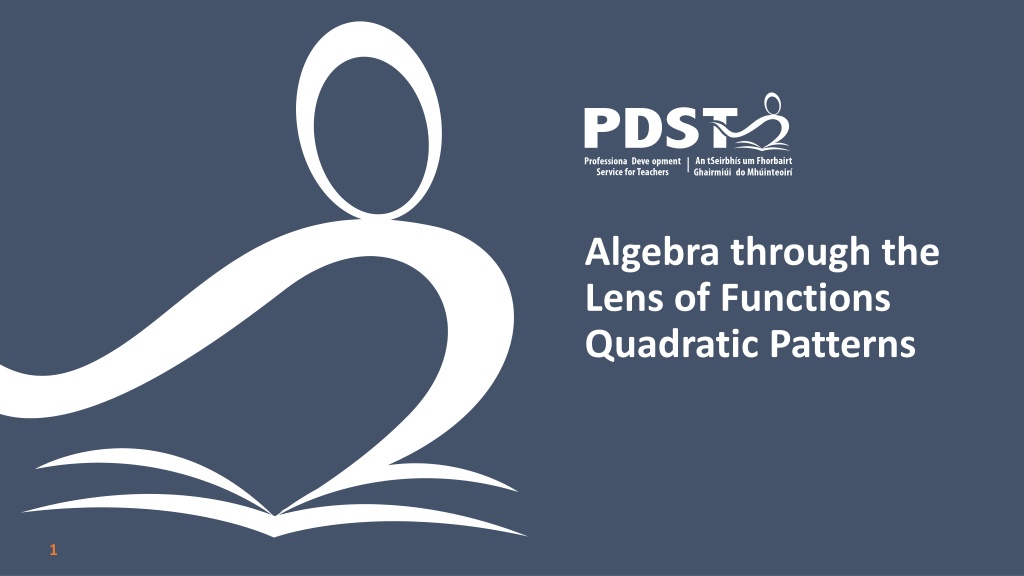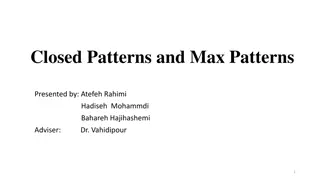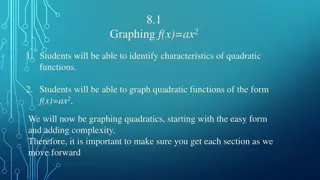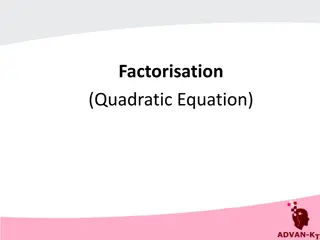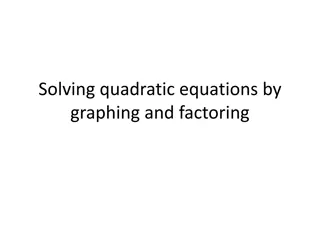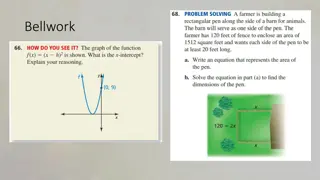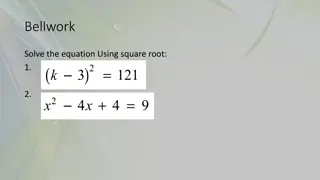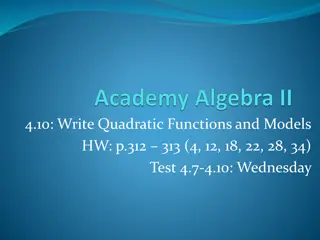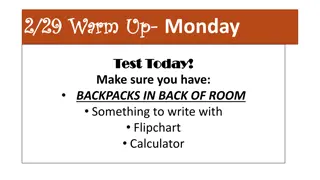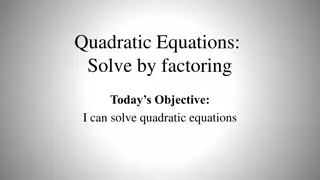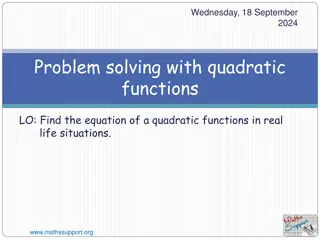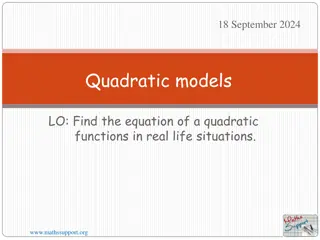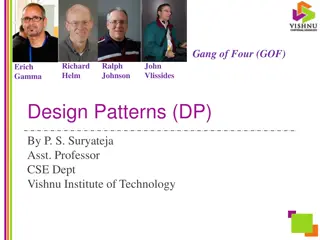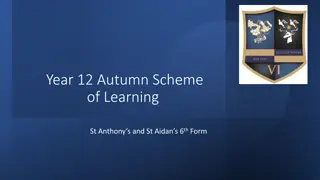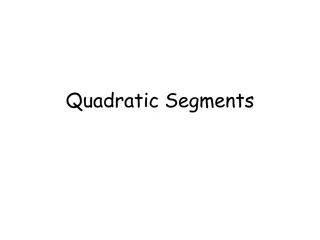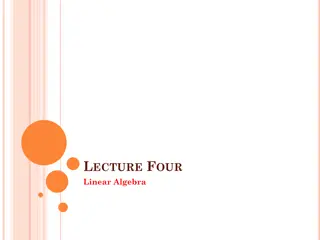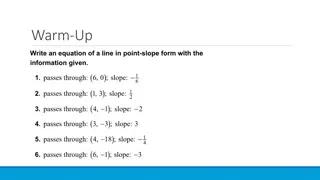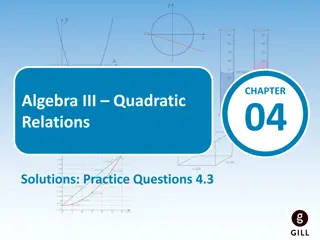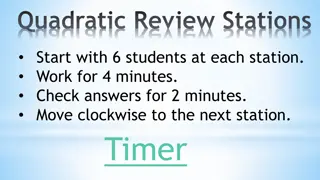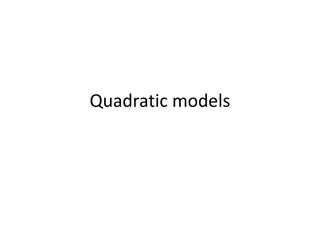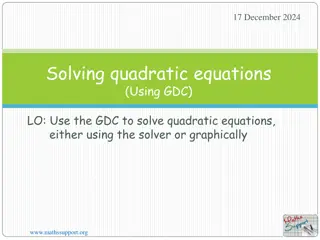Exploring Quadratic Patterns and Functions
Uncover the world of quadratic patterns, functions, and solutions through engaging activities and visual representations. Dive deep into the realm of algebra as you analyze graphs, interpret equations, and discover key features of quadratic functions. Prepare for future learning by mastering essential concepts and exploring various representations of quadratic equations.
Download Presentation

Please find below an Image/Link to download the presentation.
The content on the website is provided AS IS for your information and personal use only. It may not be sold, licensed, or shared on other websites without obtaining consent from the author.If you encounter any issues during the download, it is possible that the publisher has removed the file from their server.
You are allowed to download the files provided on this website for personal or commercial use, subject to the condition that they are used lawfully. All files are the property of their respective owners.
The content on the website is provided AS IS for your information and personal use only. It may not be sold, licensed, or shared on other websites without obtaining consent from the author.
E N D
Presentation Transcript
Algebra through the Lens of Functions Quadratic Patterns 1
Prior Knowledge Exploration of linear patterns Creating and interpreting graphs of linear functions Critical points of a linear function Understanding of a variable and constant Rate of change of a linear function
Prior Knowledge Exploration of linear patterns: Expressions Equivalence Distribution Multiple Representations
Activity How many blocks in the 50th stage?
Activity How many blocks in the 50th stage?
Activity - Solutions How many blocks in the 50th stage?
Activity - Solutions How many blocks in the 50th stage? Stage 1 Stage 2 Stage 3 .. Stage 50 3x4, 4x5, 5x6, .. 52x53 = 2756 blocks
Activity - Solutions Stage 1 1x1, 2x1 1x3 2x3 Stage 2 2x2, 2x2 2x3 2x3 Stage 3 3x3 2x3 3x3 2x3 Stage 50 50x50 2x50 50x3 2x3 =2756 blocks
Multiple Representations https://www.geogebra.org/classic/zfxp4kdg
Activity - Extensions Which stage has 90 squares?
Activity - General Which stage has n squares? b=(s+2)(s+3) b = s2+5s + 6
Future Learning Solving Quadratic Equations Key Features of Quadratic Functions Graphical Solutions to Algebraic Inequalities Analysing the Table of Values of Quadratic Functions in Greater Depth
Summary 1. Students are introduced to new algebraic procedure through the exploration of patterns. 2. Students see the need for new strategies. 3. Students make sense of their learning. 4. Students maintain a positive disposition to their mathematics.
Transformations Student s expressions: b = s2+5s + 6 b=(s+2)(s+3) What would happen if we: add 2 blocks to each stage? double the amount of blocks in the pattern? add 2 to our stage number?
Changing the output Adding a constant Student original expressions: b = s2+5s + 6 b=(s+2)(s+3) What would happen if we added 2 blocks to each stage? https://www.geogebra.org/classic/nbnhsqcp
Changing the output Multiplying by a constant Student original expressions: b = s2+5s + 6 b=(s+2)(s+3) What would happen if we doubled the amount of blocks in the pattern? b=2(s+2)(s+3) b=2(s2+5s+6)
Changing the input (stage number) Student original expressions: b = s2+5s + 6 b=(s+2)(s+3) What would happen if we add 2 to our stage number? b=(s+4)(s+5) b=(s+2)2+5(s+2)+6
Transformation of continuous functions https://www.geogebra.org/m/zj5ryyUp https://www.geogebra.org/classic/a6cddta6
